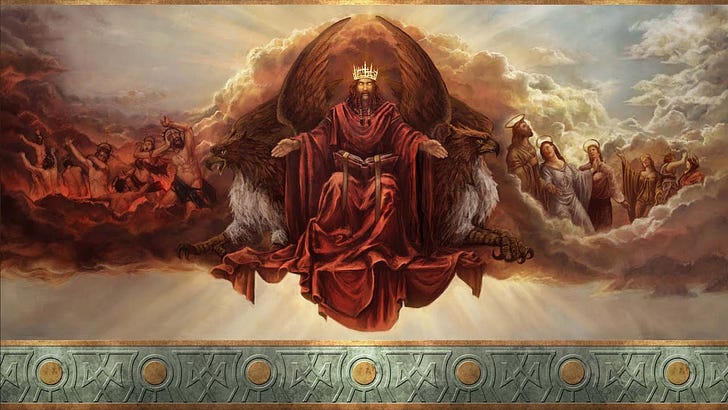“Mr. Mead's aim has been to enable the reader to obtain a glimpse of a world of which he has never heard at school, and of which no word is ever breathed from the pulpit; to take him away from the pictures which the rationalists and the apologists have presented, and to enable him to obtain an unimpeded view of that wonderful panorama of religious strife which the first two centuries of our era presented. He will here see a religious world of immense activity, a vast upheaval of thought and a strenuousness of religious endeavor to which the history of the Western world gives no parallel. Thousands of schools and communities on every hand, striving and contending, a vast freedom of thought, a mighty effort to live the religious life.”
[From a Review of Fragments Of A Faith Forgotten]
GRS Mead -- Fragments of a Faith Forgotten
“IF we turn to the Greece of the sixth century BC, we can perceive the signs of the birth of a new spirit in the Western world, the beginning of a great intellectual activity . . . New powers of thought are coming into activity, and the old-time myths and ancient oracular wisdom are receiving new expression in the infant science of empirical physics and the birth of philosophy.”
“This activity is part and parcel of a great quickening, an outpouring of power, which may be traced in other lands as well; it is an intensification of the religious consciousness of the nations, and it intensified the religious instinct of Greece in a remarkable manner.
The greatest pioneers of this activity were men whose names still live in the temple of fame. In the far East we have Confucius and Laotze, in India Gautama the Buddha, in Persia the last of the Zoroasters, in Greece Pythagoras; there were others doubtless elsewhere who acted as Messengers of the Light.
Can any who believe in the providence of Wisdom in human affairs, doubt but that this was part of some great plan for man's advancement? If there be a Providence "that shapes our ends," where can we see its hand more clearly than in such great happenings?”
The Precursors of Pythagoras
Though his later followers would have us think that all philosophy flowed from him, we cannot believe in this so sudden appearance of it, and we doubt not that Pythagoras regarded himself as the enunciator of old truths and but one of the teachers of a line of doctrine. He had Pherecydes and Anaximander and Thales before him in Asia Minor, and other teachers in Egypt and Chaldæa and elsewhere. Indeed in these early days it is almost impossible to separate philosophy from mythology and all the ancient ideas connected with it.
If we look to the times of Thales, who is regarded as the herald of the first elements of philosophy in the Grecian world, and who lived a century earlier than Pythagoras, we find a state of affairs somewhat as follows: the educated and traveled of the Greeks of the time regarded Egypt as the center of all learning and culture and their own forbears as of no account in such matters:—
“As for Hesiod and his theogony and the rest, they could make but little of them. He was doubtless more intelligible than the archaic fragments of the Orphic poems which enshrined the most ancient elements of the religious tradition of Hellas. But he fell far short of the wisdom of Egypt. As for the Orphic fragments, they were the relics of their barbarous ancestors, and no one believed in them but the superstitious and ignorant.”
And yet we find about this time that there arose a growing interest in these old fragments, which gradually led to their collection and translation into the Greek of the period.
The importance of the Orphic fragments
Why are these fragments important? The fragments are quotations primarily from Orphic texts. Orpheus is the source of what are called "The Mysteries." The Mysteries contain the deepest meaning of the ancient Greek religion, which we now call Hellenismos (Ἑλληνισμός). The Mysteries are, in truth, the heart of the religion. Without the Mysteries, there is no explanation of what the religion is actually about. These fragments reveal the story-line from which a theogony can be derived, as well as hints as to the meaning of what this theogony represents in symbolic form. Without the knowledge contained in these fragments and commentary, there is very little information as to how to properly understand ancient Greek religion.
The importance of the Orphic fragments
Orphism’s insistence on freeing the soul from physical bondage was also borrowed by Christianity, and in Orphism we can also find an origin of religious guilt and its resolution through purification rituals conducted by an elite few who claimed they could save people’s souls – which probably influenced other similar religious priesthoods that came later.
The idea that underlay the Mystery tradition in Greece was similar to that which underlay all similar institutions in antiquity, and it is difficult to find any cult of importance without this inner side. In these institutions, in the inner shrines of the temple, were to be found the means of a more intimate participation in the cult and instruction in the dogmas.
The institution of the Mysteries is the most interesting phenomenon in the study of religion. The idea of antiquity was that there was something to be known in religion, secrets or mysteries into which it was possible to be initiated; that there was a gradual process of unfolding in things religious; in fine, that there was a science of the soul, a knowledge of things unseen.



